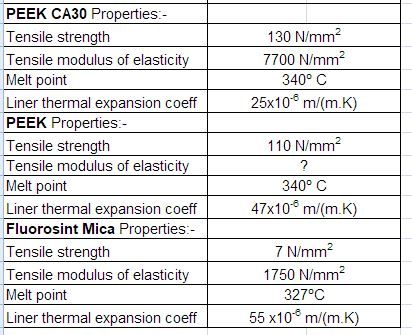Posted by Fowlers Fury on 27/11/2017 20:52:22:
John, I wonder how much additional information you provided in your "bearing grade" PEEK request
Hi Fowlers, this is the text of the email that I sent to them:
"
Dear Sirs,
I have been advised that you may be able to supply PEEK based materials in small quantities. My application is a small sliding valve for superheated steam. The part will slide on a flat surface with steam ports to allow steam in and out depending on the valve position. The matting flat surface will be stainless steel 303 or 304 grade. Dimensional stability is important but not critical because it's a flat sliding valve after all that can be designed with enough tolerances.
I am particularly looking for a reinforced bearing grade PEEK with low friction and small wear of both the plastic and the matting surface, such as KETRON PEEK-HPV, or VICTREX PEEK 450FC30. These grades are reinforced with carbon fibre and contain graphite and PTFE lubricants.
I have looked at your online store site (shopforplastic) and your ebay store, but I did not find the specific PEEK grade that I require available.
However, I found that the PEEK-HPV material is listed on your davis-plastics site. So I wonder if I can place an order by email.
Ideally, I would purchase a 20 mm diameter rod with 200 or 300 mm length, or a minimal quantity of sheet with at least 8mm thickness.
Are you able to supply this?
Thank you very much.
Kind Regards,
"
Edited By John Lluch on 28/11/2017 08:45:33
John Lluch.





